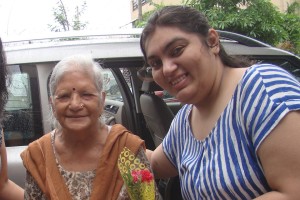Contact Us




Depression is a mood disorder that affects our emotional and mental functioning. While sadness is a major symptom of depression, many elderly with depression claim to not feel sad. Moreover, many assume that feeling low is a part of ageing and many are reluctant to talk about it. These are some reasons for why depression in the elderly is so often overlooked.
Studies reveal that Geriatric Depression in India is as frequent as 10% to 25% of the elderly population. This means that the rate of depression goes up to as much as 1 in 4 elderly.
Red Flags of Depression
|
|
|
|
|
|
|
|
|
|
|
|
Recognizing the signs and symptoms is the first step in getting help. If you notice some of the above symptoms manifesting in your loved one, then it’s a time to be alerted to the possibility of them being depressed. How can you help them?
Psychologists and counsellors can help the elderly cope and come out of the depression while medication may also be prescribed by a psychiatrist to correct the neuro-chemical imbalances that depression brings about. However, once you have recognized a depression, it’s important to understand your role in helping them.
The following are some “Do’s and Dont’s” in helping the elderly with depression:
|
DOs |
DONTs |
|
Have a calm and planned conversation with them with the aim to find out what might be bothering them and any recent changes that affected them. |
Don’t angry at them as you’re anxious about their wellbeing. Forcing them might backfire so taking it slow is important. |
|
You may use softer words such as ‘feeling blue’, going through a ‘rough time’ to take the edge off. |
Don’t use words like depression, ‘can’t cope’ or other words that may make them defensive. |
|
Reassure them that you understand how they feel and are not judging them and will support them in their decision. |
Don’t let them feel judged and labelled. They are likely to feel guilt and shame and that must be removed. |
|
Let them help themselves as far as possible and help them break down tasks into smaller activities but retaining their independence. |
Don’t take over and do everything for them. That might make them feel like a burden. |
|
Take their permission to be part of the process of visiting doctors and going for appointment so that you can help communicate to the doctor and back. |
Don’t force your way in, but seek their permission and show your intent to help. Being there to support will help make the process less scary for them. |
We at Samvedna Care aim to help seniors live happy, active and independent lives, in the comfort of their home and community through interactive caregiving.
Samvedna Care was established in October 2013 with two complementary goals – firstly to provide quality home care services to seniors with limited mobility and social interaction due to various constraints, and secondly to facilitate stimulating community interaction and participation.
Cognitive Wellness Programme, Sector 57 Gurgaon –
Samvedna’s Cognitive Wellness Programme is designed for seniors with mild cognitive impairment, early dementia or Parkinson’s, and elderly lacking in enthusiasm and motivation. The aim is to stimulate the mind of the elderly to slow the progression of the disease or impairment. The sessions are 3 days a week, 11AM-1PM.
More – http://www.samvednacare.org/our-work/cognitive-wellness-programme